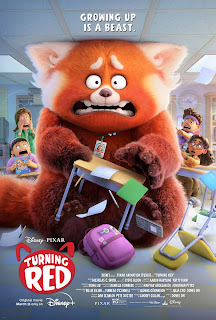It happens to the best of us - you're getting good grades in school, home life seems chill, you and your friends' favorite boy band is coming to town - but then, shortly after your 13th birthday, you wake up to find you've turned into a giant panda.
Mondays, am I right?
Jokes aside (it's not actually a Monday), Turning Red manages to be one of Pixar's most unique and delightful films in recent years because of how it finds universal truths in specific settings and situations.
Meilin Lee (Rosalie Chiang) has been trying to balance her life at home helping her parents at the temple, excelling in school, and exploring evolving interests with her tight-knit group of friends while not feeling like she's letting any of these pillars of her life down. However, a family blessing/curse strikes just as she's also on the cusp of puberty, throwing her entire world into disarray - taking her social circle and multiple generations of her family with her. One of the first brilliant strokes of the film is not to merely use this supernatural transformation as a stand-in for developing hormones or the onset of menstruation cycles, as the film baldly deals with the existence of those things as well. Instead, what Turning Red offers is something more nuanced and dangerous.
If last year's underappreciated Luca was Pixar finally pulling the trigger on making a Ghibli movie, this is very much a 1980's Amblin "kids on a genre adventure" movie transplanted into Toronto circa 2002. The ensemble of Mei's friend group is established immediately and infectiously, and I was ride-or-die for these goofballs - with their fiercely defensive love and their offbeat little rituals - just about immediately. The film unspools its story with the classic Pixar thread of "exaggerated genre thing is metaphor for complex emotional thing" as well as acknowledging more complex emotional truths in the text - from Mei's desire to fulfill her mother's expectations vs. her compulsion to take increasingly bold steps toward independence and self-discovery to the toll of multi-generational trauma reverberating across time. It's also more natural with its rules and reveals, going much lighter on "establishing How Thing Work" for every possible stopping point on the story map in favor of more visual storytelling and pure "metaphor via spectacle" discovery.
The visuals are another element that are deeper than they initially appear. In addition to the expressive character animation and nerdy details at the edge of the frame, Pixar feels more loose and playful here without sacrificing a sense of lush fidelity. The film's deceptively simple cartoonish style allows for the sort of easy physical exaggeration that Luca used to great comedic effect, but here dips its toes into some delightfully abstract (even nightmarish at times) imagery and a surprisingly robust blockbuster finale set piece. There's multiple obvious anime influences in this one, including at least one direct visual not to The Girl Who Leapt Through Time (and I'd bank on The Boy and the Beast being a big inspiration as well), but with an energy straight out of Peanuts that proves shockingly complimentary.
Turning Red isn't just proof that Pixar can stretch beyond the winning formula of their Golden Years with fresh perspectives and settings, but that - for all the talk of the film's specificity - this finds a more intimate window in the universality of youth itself. So much of Pixar's catalog plays like a reflection on childhoods gone (that children can still enjoy, clearly) or the concerns of the old for their young, but Turning Red is one of the few that gives us this much interiority to the younger cast. Part of this is thanks to the incredible voice work across the board, but especially from Chiang and her contemporaries. Part of it is also how the film will play with its own visual style on the fly to reflect a character's mood (not unlike last year's brilliant The Mitchells vs. The Machines), often to uproariously comedic effect. And it feels so rich and genuine because of how frank it is about the messy emotional tempest of that time, but in a story that is just as finely-tuned from a structure standpoint as a Toy Story 2 or Finding Nemo.
The golden age of feature animation continues, and I can't wait to see what writer-director Domee Shi and this crew gets up to next.

No comments:
Post a Comment